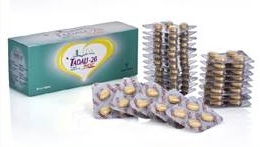Lasix Tablets (Furosemide) - Product Information
Lasix Tablets (Furosemide) is mainly used for the treatment of hypertension and edema. Lasix Tablets are used in adults and pediatric patients to treat edema that is associated with congestive heart failure, cirrhosis of the liver, and renal disease, including the nephrotic syndrome. It is the first line agent in most people with edema due to congestive heart failure. Edema is associated with heart failure, hepatic cirrhosis, renal impairment, nephrotic syndrome. Lasix is also used adjunct in cerebral/pulmonary edema where rapid diuresis is required.
Lasix tablets are manufactured by Sanofi Aventis in the strengths of 40 mg . We also have in stock Amlopres Tablets (Generic Norvasc) which is used to treat hypertension.
Name of the Drug
We supply original Lasix tablets manufactured by Sanofi Aventis.
Manufacturer of Lasix Tablets
Sanofi Aventis
Website: sanofi-aventis.com
Active Ingredient present in Lasix Tablets
The active ingredient present in Lasix Tablets is Furosemide. Each Lasix tablets for oral administration contains 40 mg of Furosemide as well as the following inactive ingredients: lactose monohydrate NF, magnesium stearate NF, starch NF, talc USP, and colloidal silicon dioxide NF.
Uses of Furosemide Tablets
Furosemide tablets (Lasix) are mainly used for the treatment of two conditions: hypertension and edema. It is the first line agent in most people with edema due to congestive heart failure. Edema is associated with heart failure, hepatic cirrhosis, renal impairment, nephrotic syndrome. Lasix is also used adjunct in cerebral/pulmonary edema where rapid diuresis is required. Furosemide tablets are also sometimes used in the management of severe hypercalcemia in combination with adequate rehydration.
Lasix Dosage
Lasix therapy must be individualized as per patient response to gain maximal therapeutic response and to determine the minimal dose needed to maintain that response. The dosage of Lasix tablets for oral administration is as follows:
Treatment of Edema (Adults):
The normal initial dose of Lasix is 20 to 80 mg given as a single dose. Normally a prompt diuresis ensues. If required, the same dose can be administered 6 to 8 hours later or the dose may be increased. The dose may be raised by 20 or 40 mg and given not earlier than 6 to 8 hours after the previous dose until the desired diuretic effect has been obtained. The individually determined single dose should then be given once or twice daily.
Treatment of Edema (Geriatric patients):
Normally dose selection for the elderly patient should be cautious, usually starting at the low end of the dosing range
Treatment of Edema (Pediatric patients):
The normal initial dose of oral Lasix in pediatric patients is 2 mg/kg body weight, given as a single dose. If the diuretic response is not satisfactory after the initial dose, dosage may be increased by 1 or 2 mg/kg no sooner than 6 to 8 hours after the previous dose. Doses greater than 6 mg/kg body weight are not recommended.
Treatment of Hypertension (Adults):
The treatment must be individualized as per the patient’s response to gain maximal therapeutic response and to determine the minimal dose needed to maintain the therapeutic response.
The usual initial dose of Lasix for hypertension is 80 mg, usually divided into 40 mg twice a day. Dosage should then be adjusted according to therapeutic response. If the response is not satisfactory, other antihypertensive agents must be added.
Storage
Store Lasix tablets at controlled room temperature 25° C (77° F) Excursions permitted from 15°C to 30°C (59°F to 86°F). Protect from light. Keep away from children and pets.
Lasix Contraindications
Lasix tablets are contraindicated in patients with a hypersensitivity to Furosemide or any inactive ingredient present in tablets. In cases of hepatic coma or precoma and conditions producing electrolyte depletion, Furosemide therapy should not be instituted until the underlying conditions have been corrected or ameliorated.
Furosemide Side Effects
The side effects of Furosemide tablets (Lasix) are as follows:
Gastrointestinal System Reactions:
- hepatic encephalopathy in patients with hepatocellular insufficiency
- pancreatitis
- jaundice (intrahepatic cholestatic jaundice)
- increased liver enzymes
- anorexia
- oral and gastric irritation
- cramping
- diarrhea
- constipation
- nausea
- vomiting
Systemic Hypersensitivity Reactions:
- severe anaphylactic or anaphylactoid reactions (e.g., with shock)
- systemic vasculitis
- interstitial nephritis
- necrotizing angiitis
Central Nervous System Reactions:
- tinnitus and hearing loss
- paresthesias
- vertigo
- dizziness
- headache
- blurred vision
- xanthopsia
Hematologic Reactions:
- aplastic anemia
- thrombocytopenia
- agranulocytosis
- hemolytic anemia
- leukopenia
- anemia
- eosinophilia
Dermatologic-Hypersensitivity Reactions :
- toxic epidermal necrolysis
- Stevens-Johnson Syndrome
- erythema multiforme
- drug rash with eosinophilia and systemic symptoms
- acute generalized exanthematous pustulosis
- exfoliative dermatitis
- bullous pemphigoid
- purpura
- photosensitivity
- rash
- pruritus
- urticaria
Cardiovascular Reaction:
- Orthostatic hypotension may occur and be aggravated by alcohol, barbiturates or narcotics.
- Increase in cholesterol and triglyceride serum levels.
Other Reactions:
- hyperglycemia
- glycosuria
- hyperuricemia
- muscle spasm
- weakness
- restlessness
- urinary bladder spasm
- thrombophlebitis
- fever
In case Lasix side effects are moderate or severe, Furosemide dosage should be reduced or therapy withdrawn.
Warnings
Lasix (Furosemide tablets ) is a potent diuretic which, if given in excessive amounts, can lead to a profound diuresis with water and electrolyte depletion. Hence, careful medical supervision is required and dose and dose schedule must be adjusted as per the needs of the individual patient.
Excessive diuresis can cause dehydration and blood volume reduction with circulatory collapse and possibly vascular thrombosis and embolism, specially in elderly patients. As with any effective diuretic, electrolyte depletion may occur during Lasix therapy, especially in patients receiving higher doses and a restricted salt intake. Hypokalemia may develop with Lasix therapy specially with brisk diuresis, inadequate oral electrolyte intake, when cirrhosis is present, or during concomitant use of corticosteroids.
In patients with severe symptoms of urinary retention, the administration of Furosemide 40 mg tablets can cause acute urinary retention related to increased production and retention of urine.
Patients allergic to sulfonamides may also be allergic to this medicine also. As with many other medicines, patients should be observed regularly for the possible occurrence of blood dyscrasias, liver or kidney damage, or other idiosyncratic reactions.
Driving a Vehicle or Performing other Potentially Hazardous Tasks
Certain side effects (e.g. an undesirable pronounced fall in blood pressure) may impair the patient's ability to concentrate and react and therefore constitute a risk in situations where these abilities are of special importance (e.g. operating a vehicle or machinery).
Lasix Overdosage
The principal signs and symptoms of Lasix overdosage with Furosemide are dehydration, blood volume reduction, hypotension, electrolyte imbalance, hypokalemia and hypochloremic alkalosis, and are extensions of its diuretic action.
Treatment of overdosage is supportive and consists of replacement of excessive fluid and electrolyte losses. Serum electrolytes, carbon dioxide level and blood pressure should be determined frequently.
Adequate drainage must be assured in patients with urinary bladder outlet obstruction (such as prostatic hypertrophy). Hemodialysis does not accelerate furosemide elimination.
Lasix (Furosemide) During Pregnancy
Furosemide has been classified by the US FDA as Pregnancy Category C. Furosemide has been proved to cause unexplained maternal deaths and abortions in rabbits at 2, 4 and 8 times the maximal recommended human dose. There are no adequate and well-controlled studies conducted in pregnant women. Lasix tablets should be used during pregnancy only if the potential benefit justifies the potential risk to the fetus.
Do not use this medicine without your doctor's consent in case you are pregnant. Stop using this medication and inform your doctor immediately if you become pregnant during treatment.
Nursing Considerations
Since Lasix is excreted in breast milk, caution should be exercised when Lasix is administered to a nursing mother. Lasix may inhibit lactation.
Do not use this medication without telling your doctor if you are breast-feeding a baby.
Buy Lasix Online at Only $0.15 per Pill
You can buy Furosemide pills online from Clear Sky Pharmacy at a cheap price. Lasix 40 mg pills, manufactured by Sanofi Aventis, India are supplied in a blister strip of 15 tablets. The 40 mg tablets cost only $0.15 per unit when you place an order for 600 tablets.
Disclaimer
The above information is provided to the best of our knowledge and in good faith, it is without a warrant of any kind, expressed or implied.
Shipping Restriction
There are no Shipping restrictions for this product.







